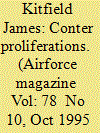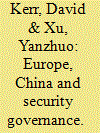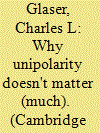| Srl | Item |
| 1 |
ID:
008030


|
|
|
|
|
| Publication |
Oct 1995.
|
| Description |
56-59
|
|
|
|
|
|
|
|
|
|
|
|
|
|
|
|
| 2 |
ID:
129638


|
|
|
|
|
| Publication |
2014.
|
| Summary/Abstract |
Normative power can be defined as the ability to govern interdependencies by means of rules, regimes and compliance strategies. This paper presents two case studies in security governance-international responsibility to protect in Sudan and counter-proliferation policies towards Iran's nuclear programme-to evaluate the degree of normative convergence between China and Europe. It concludes that there are still major differences between Europe and China on employing normative strategies in security governance but that both modes of governance and identities as security actors are mobile so that the trend is towards convergence, albeit with some distance still to travel.
|
|
|
|
|
|
|
|
|
|
|
|
|
|
|
|
| 3 |
ID:
155055


|
|
|
|
|
| Summary/Abstract |
Why do some leaders use preventive military force to destroy another country's nuclear program, while others do not? Despite nuclear proliferation becoming a growing source of concern, counter-proliferation decision making remains poorly understood. Additionally, though the preventive logic pervades the scholarship as one potential state response to relative decline, it remains unclear when this leads to war and when it does not, especially in the nuclear context. This article demonstrates that the decision to consider and use preventive force rests not only on material factors but more importantly on a leader's prior beliefs about nuclear proliferation and the threat posed by a specific adversary. Conducting original archival research and process tracing, this manuscript examines American decision making against the Communist Chinese nuclear program, and demonstrates that Presidents John F. Kennedy and Lyndon B. Johnson held fundamentally different nuclear beliefs that led to radically different preventive war preferences.
|
|
|
|
|
|
|
|
|
|
|
|
|
|
|
|
| 4 |
ID:
106954


|
|
|
|
|
| Publication |
2011.
|
| Summary/Abstract |
This article first argues that states have not balanced against US unipolar power because the potential balancers do not view the United States as a major threat, because they believe it has benign security-seeking motives, at least with regard to other major powers. This explanation runs counter to the Brooks-Wohlforth argument, which holds that states are not balancing because the magnitude of the United States' power advantage makes balancing essentially infeasible. The second part of the paper challenges the conventional wisdom on the benefits of unipolarity, arguing that the benefits the United States derives from unipolarity are generally overrated. More specifically, US security need not be significantly reduced by growth in China's economy that supports a return to bipolarity.
|
|
|
|
|
|
|
|
|
|
|
|
|
|
|
|